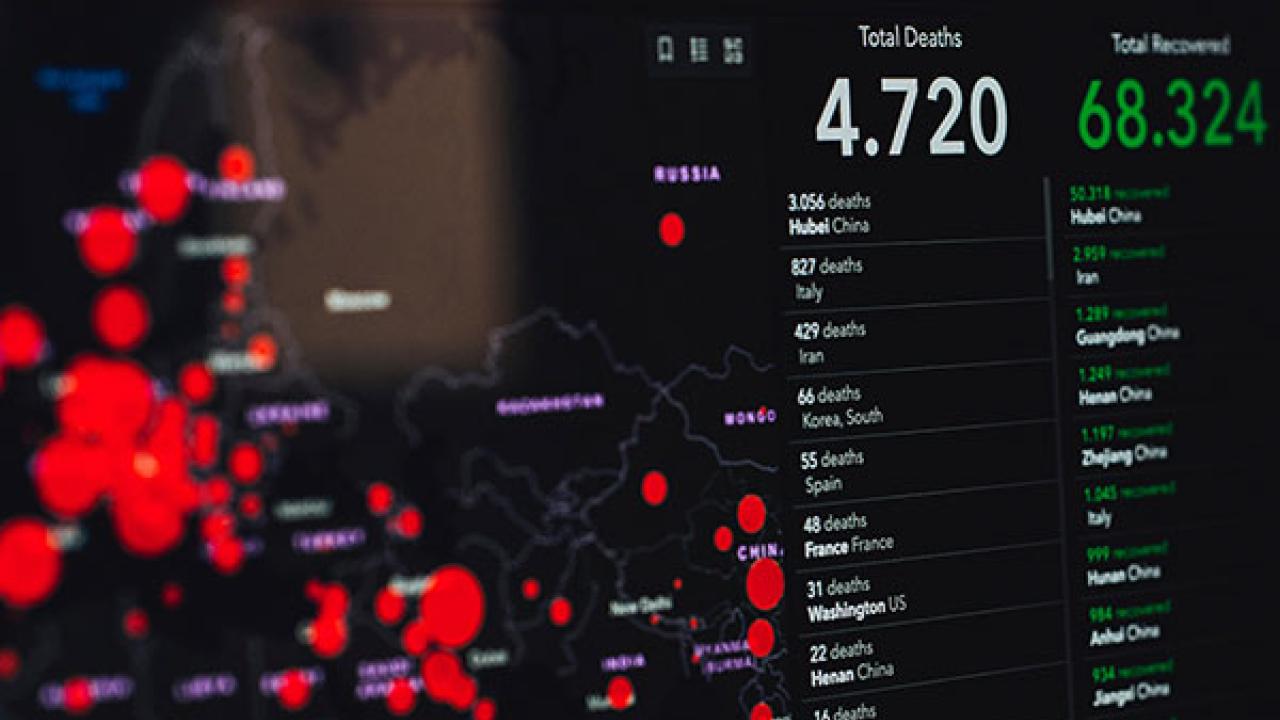
Researchers in ICTP's Quantitative Life Sciences (QLS) section are participating in a regional scientific task force to ensure the integrity of data being used in efforts to fight the spread of the coronavirus.
Daily governmental and news reports on the progression of the COVID-19 pandemic underscore how data is now playing a central role in our lives. Knowing how to read the numbers properly and interpret them correctly by identifying the parameters to be considered is fundamental. From the number of tests to the number of patients admitted to hospital, which data gives a real picture of the pandemic's progression? Can forecasts based simply on the number of people testing positive really allow us to make adequate forecasts?
These are the questions being addressed by the task force, which involves physicists, computer scientists, data scientists and statisticians from Trieste research institutes who are analysing data on the outbreak of COVID-19 in Friuli Venezia Giulia. The researchers have released a signed letter describing some limitations and possibilities for development regarding the collection and analysis of data in Friuli Venezia Giulia and in general.
ICTP's QLS scientists perform research that integrates a wide range of different disciplines, from physics to population genetics and game theory, with quantitative data to achieve new insights in domains of life sciences, from molecular and cell biology to economics and quantitative finance. Their contribution to the task force is crucial in understanding how the data on coronavirus cases can be used to outline a response roadmap.
Task force members Matteo Marsili, head of the QLS section, and his colleague Jacopo Grilli are actively monitoring the plethora of science papers about the coronavirus to digest key points that can be fed into the work of the task force. They are also using models to simulate the consequences of policies aimed at reducing the number of infections. Their goal, and that of the task force, is to help policymakers find ways to intervene ahead of COVID-19 infections, to minimize the enormous social and economic disruption caused by outbreaks.
"It's important to give an informed view to policymakers, with a clear quantification of the uncertainties so that they understand what data are needed to monitor the situation," says Grilli.
Marsili explains that the task force is focussing on what can be described as phase two of the battle with COVID-19: devising a plan to live with the virus, which is not likely to disappear soon. "Italy cannot go on for much longer under the current quarantine restrictions; we need to start as soon as possible to find a strategy for the future," he says.
The task force's analysis so far has allowed the researchers to see first-hand what can be read in the data and what the limitations are of the various techniques behind the daily forecasts, according to the letter. Data on positive test results are strongly influenced by many factors, the scientists write, and some information may lead to inaccurate assessments. Other data, however, such as the number of people hospitalized, or the fraction of people testing positive admitted to a hospital compared to all who have tested positive, give a clearer picture of the situation. The social structure of the population is equally important, particularly in small regions.
"A significant part of the increases comes from situations such as retirement homes, environments where the virus spreads easily, with unfortunately devastating effects but not representative of the virus circulation in the general population. Analyses that simply extrapolate predictions from positive numbers give apparently clear results but risk being strongly misleading, especially for long-term forecasts, because they ignore the uncertainty and incompleteness inherent in these data," the scientists write.
The researchers close the letter with a recommendation: "The COVID-19 pandemic has taken all Western countries by surprise; the sacrifices we are making now are necessary to return to a level where future infections can be controlled. Let’s not be unprepared a second time. We hope that the experience gained at this stage will lead to closer cooperation between health authorities and the scientific community to develop appropriate data collection strategies, supported by informed communication, transparent and responsible for analyses and models".
The task force initiative was promoted by the International School for Advanced Studies (SISSA). The full text of the letter (in Italian) is available here.
















